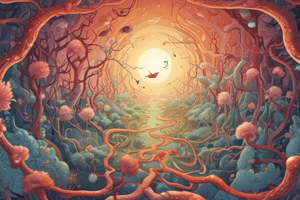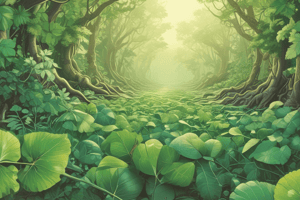Podcast
Questions and Answers
What is the scientific study of?
What is the scientific study of?
- Only ecology and genetics
- Life and living organisms (correct)
- Only plants and animals
- Microorganisms and their interactions
What is the study of heredity, genes, and genetic variation?
What is the study of heredity, genes, and genetic variation?
- Ecology
- Genetics (correct)
- Biochemistry
- Microbiology
What is the process of cell division resulting in two identical daughter cells?
What is the process of cell division resulting in two identical daughter cells?
- Meiosis
- Photosynthesis
- Respiration
- Mitosis (correct)
What is the hierarchical classification system?
What is the hierarchical classification system?
What is the process by which plants convert light energy into chemical energy?
What is the process by which plants convert light energy into chemical energy?
What is the jelly-like substance inside the cell membrane where metabolic processes occur?
What is the jelly-like substance inside the cell membrane where metabolic processes occur?
What is the study of the interactions between organisms and their environment?
What is the study of the interactions between organisms and their environment?
What is the control center of the cell where DNA is stored?
What is the control center of the cell where DNA is stored?
Flashcards
Biology
Biology
The scientific study of life and living organisms.
Cell
Cell
The basic unit of life.
Photosynthesis
Photosynthesis
Plants use light to make food.
Evolution
Evolution
Signup and view all the flashcards
Taxonomy
Taxonomy
Signup and view all the flashcards
Carbohydrate
Carbohydrate
Signup and view all the flashcards
Protein
Protein
Signup and view all the flashcards
Homeostasis
Homeostasis
Signup and view all the flashcards
Study Notes
Overview of Biology
- Biology is the scientific study of life and living organisms
- It involves the study of structure, function, growth, evolution, and taxonomy of all living organisms
- Biology explores the diversity of life on Earth, from the simplest bacteria to complex ecosystems
Branches of Biology
- Botany: study of plants and plant-like organisms
- Zoology: study of animals and animal-like organisms
- Microbiology: study of microorganisms such as bacteria and viruses
- Ecology: study of interactions between organisms and their environment
- Genetics: study of heredity, genes, and genetic variation
- Biochemistry: study of chemical processes and molecules that occur within living organisms
Cell Biology
- Cell: basic structural and functional unit of life
- Cell membrane: thin layer of lipid and protein molecules that surrounds the cell
- Cytoplasm: jelly-like substance inside the cell membrane where metabolic processes occur
- Nucleus: control center of the cell where DNA is stored
- Mitosis: process of cell division resulting in two identical daughter cells
Evolution and Classification
- Theory of Evolution: explains how species change over time through natural selection and genetic drift
- Species: group of organisms that can interbreed and produce fertile offspring
- Taxonomy: classification of organisms based on their evolutionary relationships
- Domain, Kingdom, Phylum, Class, Order, Family, Genus, Species: hierarchical classification system
Biological Molecules
- Carbohydrates: provide energy for the cell (e.g., glucose, starch)
- Proteins: perform various cellular functions (e.g., enzymes, hormones)
- Lipids: store energy and provide structure (e.g., fats, oils)
- Nucleic Acids: store genetic information (e.g., DNA, RNA)
Biological Processes
- Photosynthesis: process by which plants convert light energy into chemical energy
- Respiration: process by which cells generate energy from glucose
- Metabolism: set of chemical reactions that occur within the cell
- Homeostasis: ability of an organism to maintain a stable internal environment despite changes in the external environment
Overview of Biology
- Biology is the scientific study of life and living organisms, involving the study of structure, function, growth, evolution, and taxonomy of all living organisms.
- The field of biology explores the diversity of life on Earth, from the simplest bacteria to complex ecosystems.
Branches of Biology
- Botany is the study of plants and plant-like organisms.
- Zoology is the study of animals and animal-like organisms.
- Microbiology is the study of microorganisms such as bacteria and viruses.
- Ecology is the study of interactions between organisms and their environment.
- Genetics is the study of heredity, genes, and genetic variation.
- Biochemistry is the study of chemical processes and molecules that occur within living organisms.
Cell Biology
- The cell is the basic structural and functional unit of life.
- The cell membrane is a thin layer of lipid and protein molecules that surrounds the cell.
- Cytoplasm is the jelly-like substance inside the cell membrane where metabolic processes occur.
- The nucleus is the control center of the cell where DNA is stored.
- Mitosis is the process of cell division resulting in two identical daughter cells.
Evolution and Classification
- The Theory of Evolution explains how species change over time through natural selection and genetic drift.
- A species is a group of organisms that can interbreed and produce fertile offspring.
- Taxonomy is the classification of organisms based on their evolutionary relationships.
- The hierarchical classification system consists of Domain, Kingdom, Phylum, Class, Order, Family, Genus, and Species.
Biological Molecules
- Carbohydrates provide energy for the cell, examples include glucose and starch.
- Proteins perform various cellular functions, examples include enzymes and hormones.
- Lipids store energy and provide structure, examples include fats and oils.
- Nucleic acids store genetic information, examples include DNA and RNA.
Biological Processes
- Photosynthesis is the process by which plants convert light energy into chemical energy.
- Respiration is the process by which cells generate energy from glucose.
- Metabolism is the set of chemical reactions that occur within the cell.
- Homeostasis is the ability of an organism to maintain a stable internal environment despite changes in the external environment.
Studying That Suits You
Use AI to generate personalized quizzes and flashcards to suit your learning preferences.




